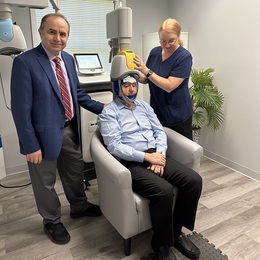
There’s been an increase in those speaking up about their struggles with mental health, especially since COVID’s lockdown. Societal awareness of the effects of a mental health condition and the fact that its occurrence is out of an individual’s control has led to productive conversations reducing the undeserved stigma of mental illness.
Societal awareness of depression has opened doors for new medical research, innovations and technology to help combat a condition affecting 5% of adults globally, according to Dr. Dal of
Depression Doctors. He also mentions a 25% increase in depression rates as a result of the pandemic, and notes that among adults with depression, one-third end up failing to respond to multiple medications and talk therapy and classified as treatment resistant depression (TRD).
When an individual with clinical depression does not see adequate improvement from an antidepressant, doctors usually suggest more medication trials and talk therapy. However, that approach and or even combination treatments might not always work.
On the other hand, transcranial magnetic stimulation (TMS) and nasal esketamine (Spravato) are both approved by the FDA as safe and effective treatment options for people struggling with treatment-resistant major depressive disorder (TRD). About 70% of individuals with TRD show significant improvement with TMS and nasal esketamine. The Depression Doctors team offers both TMS and nasal esketamine treatment beside medication management at their
Cherry Hill, Lawrenceville and Scotch Plains locations. By year’s end, they plan to offer these treatments at their New Brunswick and Easthampton sites, as well. Their providers are all board-certified in their fields and most are trained at the University of Pennsylvania or Yale University.
Dr. Dal further explains treatment response rates this way: “If we start somebody on an antidepressant, the first antidepressant in their lifetime, the chances of success are about 65%. If they did not respond after two months, then the chance to respond to a second antidepressant is about 38%. If they don’t respond to the second one, with the third one, the rate goes down to 15% to 18%. The fourth one is about 8%. So, if somebody tried four different antidepressants, we know that there’s a less than 10% chance they will respond to a new medication. On the other hand, TMS and Spravato treatments each have about 70% positive response rate in TRD.
“In terms of the history of treatment of mental health problems, early psychotropic medications have been available since the 1960s. The modern antidepressant era started in 1987 with fluoxetine (Prozac). By the year 2000, discovery and FDA approval of multiple serotonin and serotonin-norepinephrine blockers gave doctors more options to treat clinical depression. Over the last 20 years more antidepressants and augmenting medications were approved by the FDA. Nowadays, psychiatrists try many different medications and even a combination of medications and talk therapy, but still about one third of depressed patients don’t improve,” explains Dr. Dal.
“After FDA approval of TMS in 2008, we learned over time that 70% of people with treatment resistant depression improve significantly with TMS treatment. And then in 2019, Spravato came as a new FDA approved treatment option for difficult-to-treat depression. Most insurance companies and Medicare cover TMS and Spravato as safe and effective treatment options if depression does not improve with trials of two or more antidepressants and psychotherapy.”
Dr. Dal is a board-certified psychiatrist and clinical professor of psychiatry, who began his career interning for Albany Medical College in 1995 and was trained at Yale School of Medicine’s psychiatry residency program between 1996 and 1999. He and his team have been providing psychiatric treatment for New Jersey patients since 2012.
“The goal is to understand the patient, to put ourselves in a patient’s place and come up with the effective and safe treatments that we would want for ourselves or our family members. That’s the spirit I learned from my training at Yale University. It did provide me with a solid foundation of psychiatry, the importance of patient-centered care and working as a multidisciplinary team. … As doctors, we are really privileged to be able to help our fellow human beings when they’re having these difficult, very intimate struggles within themselves,” says Dr. Dal.
“Depression is very unique; you don’t see anything from outside, maybe some sadness is reflected on the face, but our depressed fellow human beings are really hurting in their heart.
… It is a very heavy burden to carry as individuals,” he continues. “With modern treatments, I think we do as well as other chronic medical illnesses, like hypertension and diabetes, in psychiatry to treat depression, anxiety, OCD, social anxiety, adjustment disorders, mood disorders, etc.”
Even if your depression or other mental health difficulties might have not responded to medications, TMS or Spravato treatments might work for you. Speaking with a compassionate expert who can conduct an evaluation, provide you with treatment options, and determine if you would qualify for these treatments may finally bring you some joy and relief from depression and other psychiatric problems.
Depression Doctors
Multiple locations including Cherry Hill
(856) 208-7300
DepressionDoctors.com
Click here to subscribe to the free digital editions of South Jersey Magazine
To read the digital edition of South Jersey Magazine, click here.
Published and copyrighted in South Jersey Magazine, Volume 20, Issue 8 (November 2023)
For more info on South Jersey Magazine, click here.
To subscribe to South Jersey Magazine, click here.
To advertise in South Jersey Magazine, click here.












